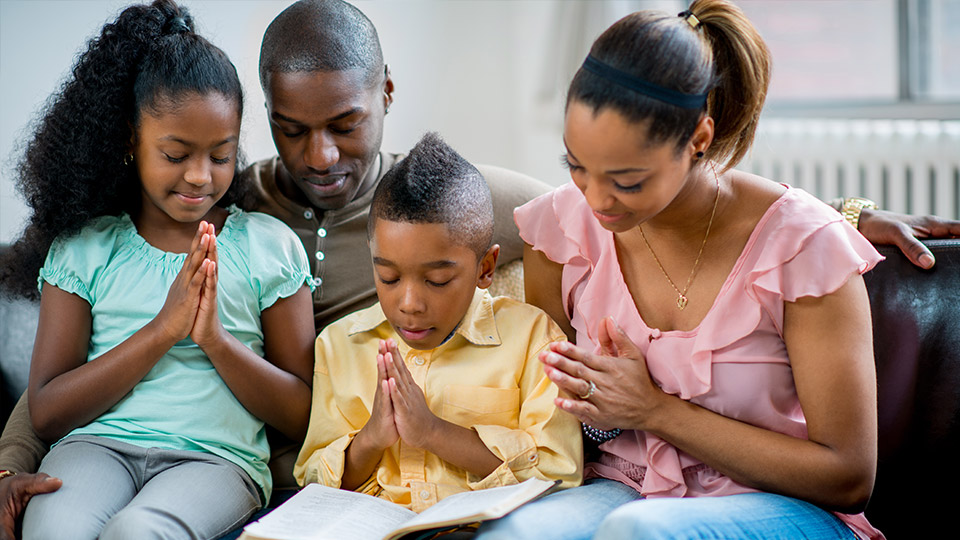Fathers, Bless Your Children
An explanation of paternal blessingsFathers, Bless Your Children
Cardinal Ratzinger, who became Pope Benedict XVI, encouraged all parents to bless their children regularly. He recounts his experience with receiving the blessing of his parents as a child: “I shall never forget the devotion and heartfelt care with which my father and mother made the sign of the Cross on the forehead, mouth, and breast of us children when we went away from home, especially when the parting was a long one. This blessing was like an escort that we knew would guide us on our way. It made visible the prayer of our parents, which went with us, and it gave us the assurance that this prayer was supported by the blessing of the Savior. The blessing was also a challenge to us not to go outside the sphere of this blessing. Blessing is a priestly gesture, and so in this sign of the Cross, we felt the priesthood of parents, its special dignity and power. I believe that this blessing…should come back in a much stronger way into our daily life. 1 Joseph Cardinal Ratzinger, The Spirit of the Liturgy, (San Francisco, CA: Ignatius Press, 2000),184.
Listen to the author's commentary on our podcast.
Background: What is a Blessing?
Catholics see and receive blessings at practically every mass, wedding, funeral, and parish event where a priest or deacon is present, but what is a blessing? The word blessing comes from the Latin benedīcere, which means ‘to speak well of someone’ or ‘to commend.’ Essentially, then, a blessing commends someone to God in a particular way.
Properly speaking, a blessing is a sacramental. The Catechism of the Catholic Church explains that “Sacramentals are instituted for the sanctification of…a great variety of circumstances in Christian life…they always include a prayer, often accompanied by a specific sign, such as the laying on of hands, the sign of the cross, or the sprinkling of holy water.” Sacramentals do not give grace in the same way that the sacraments do, but they prepare the recipient to better receive and cooperate with God’s grace. Blessings are the first and most important kind of sacramental; they prepare people who are rightly disposed to praise God and receive His gifts.2Catechism of the Catholic Church, 2nd ed. (Washington, DC: United States Catholic Conference, 2000), 1668.
Kinds of Blessings and Who Gives Them
The Book of Blessing notes that: “The ministry of blessing involves a particular exercise of the priesthood of Christ,”3 International Commission on English in the Liturgy, Book of Blessings, (Totowa, NJ: Catholic Book Publishing, 1989),18. and the bishop, therefore, is the chief minister of blessings in his diocese. Priests, and deacons to a lesser extent, because of their ordination, preside at most blessings in the absence of the bishop. Even instituted acolytes and lectors, at the discretion of the bishop, can impart certain blessings. So, as we might expect, the clergy are generally the ones who give blessings, but why? Lumen Gentium, the Second Vatican Council’s Dogmatic Constitution on the Church, says: “Though they differ from one another in essence and not only in degree, the common priesthood of the faithful and the ministerial or hierarchical priesthood are nonetheless interrelated: each of them in its special way is a participation in the one priesthood of Christ. The ministerial priest, by the sacred power he enjoys, teaches and rules the priestly people; acting in the person of Christ, he makes present the Eucharistic sacrifice, and offers it to God in the name of all the people. But the faithful, in virtue of their royal priesthood, join in the offering of the Eucharist. They likewise exercise that priesthood in receiving the sacraments, in prayer and thanksgiving, in the witness of a holy life, and by self-denial and active charity.”4 Vatican Council II, Dogmatic Constitution on the Church Lumen Gentium (21 November, 1964), 10. Our bishops, priests, and deacons can bless us chiefly for two reasons: they participate in the priesthood of Christ and act in the person of Christ in a special way because of their ordination and they have spiritual authority over the people they are called to serve.
Yes, You Can Bless Your Kids
The priests and deacons of our parishes aren’t the only men who can bless. The Catechism notes that: “Sacramentals derive from the baptismal priesthood: every baptized person is called to be a ‘blessing’ and to bless. Hence lay people may preside at certain blessings…” 5 Catechism of the Catholic Church.1669. Fathers also participate in the priesthood of Christ, because of their baptism, as Lumen Gentium noted. Further, fathers are the head of the domestic church and possess spiritual authority over their wives and children.6Pope Pius XI notes in Casti Connubii: “Domestic society being confirmed, therefore, by [marriage], there should flourish in it that “order of love,” as St. Augustine calls it. This order includes both the primacy of the husband regarding the wife and children and the ready subjection of the wife and her willing obedience, which the Apostle commends in these words: Let women be subject to their husbands as to the Lord, because the husband is the head of the wife, and Christ is the head of the Church.” Cf. Pope Pius XI, Encyclical on Christian Marriage Casti Connubii (31 December, 1930), 26.6 Fathers, then because of their baptismal priesthood and authority over their families, can bless their children in a very similar way to how priests and deacons bless their parishioners. This should not come as a surprise, since fathers have been blessing their children long before Christ instituted the ministerial priesthood. Many of the patriarchs blessed their sons in the Old Testament, see Issac’s Blessing for Jacob in Genesis 27 or Jacob’s blessings for his sons in Genesis 49, for example. It has always been part of God’s plan for fathers to bless their children. 7 Book of Blessings, 18.
In more recent times, the Church has begun to promote the importance of the blessing of children by their parents. The Constitution on the Liturgy of Vatican II, Sacrosanctum Concilium, called for the preparation and publication of blessings suitable for lay people to preside at.8Vatican Council II, Constitution on the Sacred Liturgy Sacrosanctum Concilium (4 December, 1963), 79. In response, the Book of Blessings, which is the Church’s official manual on blessings published in 1984, contains several blessings which lay people may give. It says: “Laypersons exercise this ministry [blessing] in virtue of their office, for example, parents on behalf of their children.9Book of Blessings, 18.
Parental vs. Clerical Blessings
It should be noted, though, that laypeople do not preside in the same way as clerics at blessings. Monsignor Rossetti notes that the common consensus among theologians today is that only bishops and priests directly impart blessings, because they alone act In persona Christi Capitis, in the person of Christ the head.10 Stephen J Rossetti, The Priestly Blessing, Rediscovering the Gift, (Notre Dame, IN: Ave Maria Press, 2018), 108. Lay people, rather than imparting blessings, invoke blessings. Essentially, the laity ask that God send a blessing, while a priest or bishop blesses more directly, because of his ordination.
On a practical level, the Book of Blessings and the Book of Catholic Household Blessings and Prayers suggest that, while clerics typically invoke blessings with their arms spread wide, the laity should invoke blessings with their hands together, by making the sign of the cross on the forehead of their child, or by laying their hands on the child’s head. Further, preference is always given to the highest-ranking cleric when a blessing is to be given. 11 Book of Blessings, 16.The blessing of a bishop is to be preferred to the blessing of a deacon, for example, and so parents only bless their children in the absence of a cleric.
How to Bless Children
The Church, in the Book of Blessings and Book of Catholic Household Blessings and Prayers, provides many blessings that parents may use. Here are a few examples:
- “Father, inexhaustible source of life and author of all good, we bless you and we thank you for brightening our communion of love by your gift of children. Grant that our children (child) will find in the life of this family such inspiration that they (he/she) will strive always for what is right and good and one day, by your grace, reach their (his/her) home in heaven. We ask this through Christ our Lord.” 12 Book of Blessings, 162.
- “May the Lord keep you and make you grow in his love, so that you may live worthy of the calling he has given you, now and forever. Amen.” 13 Book of Blessings, 166.
- “God of all creation, we offer you grateful praise for the gift of life. Hear the prayers of (name), your servant. Bless him/her with your presence and surround him/her with your love so that he/she may enjoy many happy years, all of them pleasing to you. We ask this through Christ our Lord. Amen” 14 Book of Blessings, 308.
- “The Lord said to Jeremiah: Before I formed you in the womb I knew you, before you were born I dedicated you. May God, in whose presence our ancestors walked, bless you, Amen. May God, who has been your shepherd from birth until now, keep you, Amen. May God, who saves you from all harm, give you peace, Amen.” 15 United States Conference of Catholic Bishops, Catholic Household Blessings and Prayers, Revised Edition, (Washington, DC: United States Conference of Catholic Bishops, 2008), 242.
Some of the blessings in the liturgical books are much shorter:
- “May God Bless you. May God keep you safe. God be with you. God be in your heart. May God bless and protect you” 16 Book of Catholic Household Blessings and Prayers, 239.
The aforementioned liturgical books contain many other blessings to be led by parents, like before the first communion or a wedding, or the blessing of the family advent wreath or a nativity scene on Christmas, for example. So please consult those books for even more blessings to pray with your children. It is also worth noting that the Book of Blessings is also available in Latin as “De Benedictionibus,” should you wish to bless your children in the official language of the Church.
It should be noted that the blessings in the Church’s liturgical books are not the only possible way to bless your child. Monsignor Stephen Rosetti, one of the foremost scholars of blessings today, argues that: “In fact, ministers of blessings are encouraged to adapt the words to fit the situation while maintaining the structure and major parts intact.” 17Rosetti, The Priestly Blessing, 85. Many parents use Aaron’s blessing from the Book of Numbers, for example: “May the Lord bless you and keep you. May the Lord make his face to shine upon you and have mercy on you. May the Lord turn his countenance to you and give your peace” (Numbers 6: 24-26). Certainly, in much the same way that a priest may say: “May Almighty God bless you, Father, Son, and Holy Spirit,” a father may opt to give a similar, simple blessing to his child.
Conclusion
However you do it, go and bless your children! Bless them before bed, before they go to school, before they leave your house after visiting you. Bless them whenever you can! A father is the priest of the domestic church, just as Christ is the high priest of the whole Church. Just as Christ mediates between the Father and mankind, so too does the father of the house mediate God to his children, both by his example and by his prayers. The blessing of a father for his children is a powerful thing; do not deprive your children of it.
Further Reading: Related Articles and Books:
- International Commission on English in the Liturgy. Book of Blessings. (Totowa, NJ: Catholic Book Publishing, 1989).
- Ratzinger, Joseph. The Spirit of the Liturgy. (San Francisco, CA: Ignatius Press, 2000).
- Rossetti, Stephen J. The Priestly Blessing, Rediscovering the Gift. (Notre Dame, IN: Ave Maria Press, 2018).
- United States Conference of Catholic Bishops, Catholic Household Blessings and Prayers, Revised Edition. (Washington, DC: United States Conference of Catholic Bishops, 2008).
- Pope Pius XI. Encyclical on Christian Marriage Casti Connubii (31 December, 1930).
- Vatican Council II, Constitution on the Sacred Liturgy Sacrosanctum Concilium (4 December, 1963).
- Vatican Council II, Dogmatic Constitution on the Church Lumen Gentium (21 November, 1964).
- Omnium in Mentem, Apostolic letter on Canon Law, Pope Benedict XVI.
- Fathers, Bless Your Wives & Children (thosecatholicmen.com)
- CATHOLIC ENCYCLOPEDIA: Blessing (newadvent.org)
Questions for Small Group Discussion
- Have you ever seen anyone bless their children? Did it strike you as positive, negative, or neutral?
- Do you ever bless your wife and/or your children?
- How can fatherly blessings be incorporated into family prayer? What good might come from a father routinely blessing his children?
- Are there certain occasions in your family that might be a good occasion for a blessing like birthdays, baptism anniversaries, saint feast days, etc.?
- What changes might a father need to make in his own spiritual life to better become the spiritual leader of his family?
- What specific things might you need to change in your life that diminish your spiritual credibility in your children’s or wife’s eyes?
Interested in joining a FORGE group? Fill out this form and we’ll follow up with you right away!

Taylor Fernholz, O.P.
Share This
Sources
- 1Joseph Cardinal Ratzinger, The Spirit of the Liturgy, (San Francisco, CA: Ignatius Press, 2000),184.
- 2Catechism of the Catholic Church, 2nd ed. (Washington, DC: United States Catholic Conference, 2000), 1668.
- 3International Commission on English in the Liturgy, Book of Blessings, (Totowa, NJ: Catholic Book Publishing, 1989),18.
- 4Vatican Council II, Dogmatic Constitution on the Church Lumen Gentium (21 November, 1964), 10.
- 5Catechism of the Catholic Church.1669.
- 6Pope Pius XI notes in Casti Connubii: “Domestic society being confirmed, therefore, by [marriage], there should flourish in it that “order of love,” as St. Augustine calls it. This order includes both the primacy of the husband regarding the wife and children and the ready subjection of the wife and her willing obedience, which the Apostle commends in these words: Let women be subject to their husbands as to the Lord, because the husband is the head of the wife, and Christ is the head of the Church.” Cf. Pope Pius XI, Encyclical on Christian Marriage Casti Connubii (31 December, 1930), 26.6 Fathers, then because of their baptismal priesthood and authority over their families, can bless their children in a very similar way to how priests and deacons bless their parishioners. This should not come as a surprise, since fathers have been blessing their children long before Christ instituted the ministerial priesthood. Many of the patriarchs blessed their sons in the Old Testament, see Issac’s Blessing for Jacob in Genesis 27 or Jacob’s blessings for his sons in Genesis 49, for example. It has always been part of God’s plan for fathers to bless their children. 7 Book of Blessings, 18.
- 7
- 8Vatican Council II, Constitution on the Sacred Liturgy Sacrosanctum Concilium (4 December, 1963), 79.
- 9Book of Blessings, 18.
- 10Stephen J Rossetti, The Priestly Blessing, Rediscovering the Gift, (Notre Dame, IN: Ave Maria Press, 2018), 108.
- 11Book of Blessings, 16.
- 12Book of Blessings, 162.
- 13Book of Blessings, 166.
- 14Book of Blessings, 308.
- 15United States Conference of Catholic Bishops, Catholic Household Blessings and Prayers, Revised Edition, (Washington, DC: United States Conference of Catholic Bishops, 2008), 242.
- 16Book of Catholic Household Blessings and Prayers, 239.
- 17Rosetti, The Priestly Blessing, 85.


